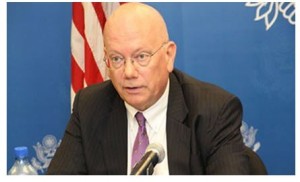
The United States ambassador to Nigeria, James Entwistle, has reaffirmed the commitment of the United States to help Nigeria in the fight against terrorism.
The ambassador made this assertion yesterday in Abuja while fielding questions from journalists on Boko Haram’s pledging of allegiance to the Syrian terror group, ISIS, at a town hall meeting organised by the International Visitor Leadership Programme in collaboration with the Transition Monitoring Group (TMG).
According to the envoy, “No one is doing more to help Nigeria in the fight against terrorism and no one is doing higher than the US to stop ISIS.”
Ambassador Entwistle’s statement seemed to be a response to the local feeling that the US was not very supportive of Nigeria’s battle against Boko Haram, unlike its proactive actions against terrorists around the world.
LEADERSHIP recalls that Nigeria’s ambassador to the US, Prof. Adebowale Adefuye, had last year claimed that the federal government was dissatisfied “with the scope, nature and content of the US’ support” for the country in its war against Boko Haram, especially for failing to avail Nigeria effective military hardware to deal decisively with the insurgents
According to him, the US government had refused to sell its weapons to the Nigerian government to help the country fight the ravaging insurgency.
But the US government had responded that its military assistance was to be strictly on intelligence gathering and not for logistics or combat, citing Nigerian soldiers’ alleged rights violation in the fight against insurgency.
It was further alleged that the US was the hidden hand behind the seizure of $15million from the federal government by South African authorities, meant for black market arms purchase in South Africa last year.
Checks also reveal that following the abduction of the Chibok schoolgirls last year, the Nigerian government had, in a bid to procure cutting-edge military hardware, placed an order with the US government for armament.
Strangely, the US government balked at this order, and after eight months of inaction, President Jonathan had to, in September last year, seek a roundtable with President Barack Obama after the 69th Session of the UN General Assembly in Washington over the fate of the armament order.
Following the snub from the US, the federal government made a decisive move to upgrade the aerial capability of the military with the procurement of some Chinook helicopters from Israel. The Nigerian military needed the heavy-lifting CH-47 Chinooks and Sikorsky CH-53 for the swift transportation of its men and armament to the northeast frontlines. The Chinook is a US built military chopper, built by Boeing. All the Nigeria government wanted to do was to buy from the stock in the Israeli armoury, a third party transaction, but the US again stepped in and stooped the transaction after Israeli Prime Minister Benjamin Natayahu had already approved the sale.
It was these, in the face of rampaging and bloody campaigns of the insurgents against defenceless Nigerians and an ill-equipped military, that led Adefuye to declare federal government’s reservations with US’ stance.
Speaking on the town hall meeting with the theme, “The Role of the Media in Institutionalising Issues-based Election Campaigns,” TMG chair, Comrade Ibrahim Zikitullahi, said, “There is no under- estimating the heavy burden on the media as the Fourth Estate of the Realm and as collective heirs of the struggle of the heroes of Nigeria’s evolving democracy. The responsibility is such that would task every bit of the resources at their disposal that the organisers decided to host the town hall meeting.
“The theme chosen is apt because, in this season or electoral politics, there is a risk of losing sight of the issues because of the damaging atmosphere of hate and mischief by politicians, but the media must not aid or abet them.
He further stated that the role of the media was “to amplify the voices of the Nigerian people, as such the media should be able to capture, document and synthesise what constitute the pains and hopes of Nigeria in this season of political renewal,” adding that in-formation dissemination should be about how to proffer solutions to the many problems faced by Nigerians.
Zikitulahi urged the media to focus on issues-based programmes and advertisement, and condemned the character assassination and name-calling domination the electioneering activities.
“It is even worse and disappointing that in the face of offensive and violent messages being pushed by the prints and broadcast media, the regulatory agencies look away and therefore set the stage for potential violent poll,” he said.
“In the end, Nigeria’s democracy, the quest for good governance, and the media itself would all be beneficiaries of an issues-based conversation.”
He paid tributes to journalists who put their lives at risk for the nation to enjoy the present democracy, saying there can be no better way to honour these special heroes of democracy than by mounting issues-based discussions about the 2015 electoral processes.







